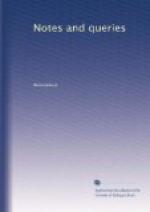“Though fierce in his valour like Lleon, with a violent irresistible assault, he vaulted into battle, to plunder the King of Bernicia; yet the ravager of thrice seven dominions was a placid and liberal-handed chief, when he entertained the bards at his magnificent table.”
It is not supposed that the king here mentioned was any thing more than a powerful nobleman, whose possessions, or castle and lands, were situated in the north of England; in which division of the island the ancient Bernicia was placed. As there is no evidence as to the locality or limits of this ancient district, it is hoped that an answer to the above query will afford a satisfactory solution to an uncertainty that has long existed among Welsh antiquaries.
Gomer.
{336}
John Bull.—Might I beg to ask, through your columns, the origin of the name “John Bull,” as applied to Englishmen? I have frequently heard the question asked; but I never heard it satisfactorily answered. An antiquary once told me that it was so applied from the number of Johns among our countrymen, and the profusion of bles in our language; an explanation which I placed to the credit of my friend’s ingenuity.
R.F.H.
* * * * *
REPLIES.
LETTER ATTRIBUTED TO SIR ROBERT WALPOLE.
I feel very confident that I once read the letter attributed to Sir R. Walpole (No. 19. p. 304.) in some magazine, long before I had ever seen Banks’ Extinct and Dormant Peerage. My impression is, also, that I never believed the document to be authentic; and that opinion is confirmed by a reference to the Correspondence of Horace Walpole, vol. i. ed. 1840, and to the journals of the day. I find from these authorities, that the first of the memorable divisions which drove Sir Robert from the helm, took place on the 21st Jan. 1741-2, when Pulteney’s motion for a secret committee was lost by three voices only. We are told that the speeches were very brilliant, and Sir R. Walpole particularly distinguished himself. He might have been tormented by his enemies, but not by the stone, (the excuse assigned in the letter for his inability to attend the king), for Horace left him at one o’clock in the morning, after the debate had terminated, “at supper all alive and in spirits,” and he even boasted that he was younger than his son. The next struggle was on the 28th of Jan., on the Chippenham election, when the minister was defeated by one, and his friends advised him to resign; but it was not till after the 3rd of Feb., when the majority against him upon the renewal of the last question had increased to sixteen, that he intimated his intention to retire. These facts, coupled with the inferences drawn by your correspondent P.C.S.S. as to the suspicious style of the letter, and the imprudence of such a communication, go far to prove that it was a forgery: but the passage in Walpole’s Reminiscences, vol. i. p. cviii. ed. 1840, with which I will now conclude my remarks, seems to set the question at rest:—




